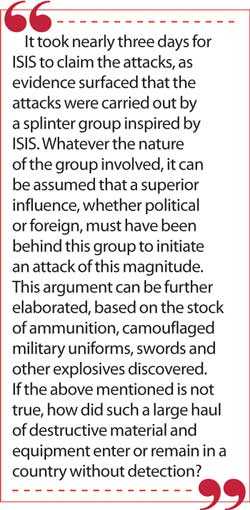Tuesday Feb 24, 2026
Tuesday Feb 24, 2026
Tuesday, 14 May 2019 00:15 - - {{hitsCtrl.values.hits}}

Over three weeks have passed, since the people of Sri Lanka were made subjects of a deadly terror attack that transmitted shock waves amongst the entire strata of the population. Unlike the LTTE, the group involved in these acts of terror appeared to be far superior in their organisation, conduct and implementation. Many lives were lost, changed and the ill effects would take many years to heal.
What led to this scenario? Was it negligence, incompetence or was it a conspiracy?
What is special about Sri Lanka?

Sri Lanka relishes on a pivotal geographic position that borders many shipping and logistics routes that provide direct strategic entry to key markets in neighbouring continents. Sri Lanka can serve as the base for leading super powers, in their global quest to gain military and economic control of the region. Currently, USA, China and India utilise Sri Lanka to mobilise their strategic operations.
Chinese influence in Sri Lanka
Despite the investment appeal of Sri Lanka, as a country free of conflict, since 2009, it was mainly the Chinese that have dominantly laid foot to expand their investments in the country. The Chinese have concentrated many investment projects and infrastructure constructions under their Belt and Road Initiative (BRI). The Chinese imprint is placed on key investment projects including Colombo International Financial City, Colombo International Container Terminals and Hambantota Port and Airport. Chinese private investments in Sri Lanka have also grown rapidly to include hotel construction, agricultural product processing, manufacturing, warehouse logistics, etc.
The Chinese clearly exploited on the weak financial foresight of the Rajapaksa Government, by granting several loans to erect key infrastructure projects including the Hambantota Port. It is yet inconclusive as to the credibility of the prior feasibility reports conducted on such projects which have now led to Chinese gaining operational control of such key infrastructures within an important geography of the country. Key terms of the loans included the deployment of Chinese labour and institutions for certain sections of the project.
A case of leveraged construction was evident with the Port City project signed during the Rajapaksa tenure, yet again raising key concerns as to why such terms allowing the Chinese to gain a clear stronghold in the country was permitted. Based on such observations, it could be debated whether the Chinese had a plan or conspired to gain geographic and economic control in Sri Lanka.
The human rights issue
Human rights allegations concerning the security forces pertaining to the final stage of the ethnic conflict, is still a key topic that captures international headlines. Several resolutions were passed at the United Nations by USA against Sri Lanka on the accusations. USA sponsored resolutions came at a time where the USA economy was in the recovery stage after one of their worst recessions in history, and also at a time where the Chinese was gaining a strong foothold in Sri Lanka, exploiting the dictatorial political regime during that time.
The culmination of such resolutions towards eminent sanctions, would have led to the Chinese dominance in Sri Lanka also subsiding with the probable imposition of trade restrictions. An argument could be raised on this strategy as a strong democratic ploy to prevent the geographic expansion of a competing super power.
The Rajapaksa regime did their best to portray the passage of the resolutions as a conspiracy against the nation, and the very point was a key inclusion in the political rhetoric, in which propagandas were carried out to portray President Rajapaksa as a patriot that never succumbed to foreign influences.
President Rajapaksa became more and more popular with the passage of such resolutions each year. This was clearly evident in provincial elections held during such times, until his close henchman, then Minister Sirisena betrayed him to contest the Presidential election from the opposing fraction. These events, could build an argument as to whether the UN resolutions were also a key political ploy to sustain popularity and power.
Entry of ISIS
ISIS resembles the most violent terrorist organisation in the world today. The Islamic extremist based group is engulfed with educated and astute individuals, which is in contrary to the poverty enriched youth enrolled terrorism witnessed with the LTTE. It was surprising to note that certain suicide bombers held a degree and were educated in renowned universities overseas.
The key question to raise is how were such personalities from such families brainwashed into committing these inhuman acts. Was it actually the desperation to be with the 72 virgins promised in their afterlife or was it a result of a devotion towards their camaraderie, against the defeats of ISIS in several countries such as Iraq, as well as for the recent shootings in New Zealand.
It took nearly three days for ISIS to claim the attacks, as evidence surfaced that the attacks were carried out by a splinter group inspired by ISIS. Whatever the nature of the group involved, it can be assumed that a superior influence, whether political or foreign, must have been behind this group to initiate an attack of this magnitude. This argument can be further elaborated, based on the stock of ammunition, camouflaged military uniforms, swords and other explosives discovered. If the above mentioned is not true, how did such a large haul of destructive material and equipment enter or remain in a country without detection?
Selfish political leadership
The Government elected in 2015, was installed to bring hope and prosperity, after the perceived dictatorial regime of President Rajapaksa was evicted from office. However, as we enter the fifth year of the perceived people’s revolution, we are hardly to witness any constructive development to the lives of the people or to the country as a whole. Further, the political divide between the President and Prime Minister has created many challenges to the governance structure and its repercussions have been felt by the people.
The situation is even worse as the public is left with no choice other than to elect political candidates in both the Government and opposition that seek public office to harvest only on their personal interests.
Today, it is not a difficult question to answer on who is the country’s worst President or Prime Minster in history.
Since 2010, the political leaders of our country were driven by lavish ambitions of development and growth to replicate a more developed nation in time.
However, it seems to have worked only on them, as evident with the many boundless allegations of corruption and nepotism levelled against them. The foreign investments that should have been attracted to the nation have not materialised. There seem to be allegations levelled against politicians, about investors shying away from key investments sighting claims of bribery.
It is evident that the selfish political leadership from the point of the cessation of the war created a power hunger among the politicians. Such personal ambitions created the inability to take action against extremist groups, prevent social unrests and foster reconciliation. Such standings provided the environment from which terror groups could thrive and the results of their actions were felt on 21 April.
The recent attacks depicted why the country requires a strong Government with consensus between the Executive and Prime Minister. Both individuals indulged in the blame game sighting neither was aware of the countless warnings that were brought forward to their attention in advance of the attacks. It will also be one of the unresolved mysteries, as to why the IGP and Secretary of Defence took no action, if they received the information in advance. Were both the IGP and Secretary of Defence made the scape goats to sustain the political survival of certain key leaders or were they actually responsible, due to their mere negligence. The truth will be known one day, and hope it would be made public.
Imminent consequences 
The country will get entangled in more debt, to an extent where the ruling Government will have to bridge the lost tax revenues and other benefits provided for the affected sectors. The Sri Lanka Rupee, has dipped in double digits against the dollar, during the year 2018, much to the peril of local businesses that depend on imports. Hope the authorities will take the required measures to ensure it would not lead to a similar state this year. The tourism sector has felt the brunt of the impact with significant cancellations in tourist bookings. There will be a growing trend towards brain drain, as more and more professionals are seemingly leaving the country for better prospects.
Impact on the next presidential election
It was not until the near distant future, that the most pressing issue to be addressed by the next President was the ailing economy. However, the recent attack has shifted the momentum entirely towards the safety and security of the country. It is sad how certain political hopefuls have used the tears and blood of the victims to foster their presidential ambitions. Some politicos and their henchman are constantly seen filming short clips, partaking in interviews in front of the attack locations to arouse the patriotic notion favouring their party.
Gotabaya Rajapaksa is now the most likely candidate to clinch the Presidency at the next election, given the primary importance given to security of the country. It is quite a coincidence that such an unsavoury situation happened in a year when the people have to make their choice for their new leader.
Is everything lost for Sri Lanka?
Certainly, everything is not lost for Sri Lanka. The biggest problem Sir Lanka faces is the lack of patriotic political leaders. Idiocy applies to the majority of the political leaders of our country. Due to the lack of prudent choices, the people have to resort to electing those seeking power to enhance their businesses, status and illicit activities. Also most of our politicians are stingy for power and they would do whatever necessary to gain power, even conspiring at whatever the cost to the masses.
Sri Lanka has a history of betrayals from the time of the kings, to gain the right to rule and do not think such intentions have subsided among the present political rulers as well. Hopefully, their decisions would not be that adverse as no one wants these acts of terror to develop to an extent as to what is witnessed in countries such as Afghanistan, Syria, Iraq and Libya.
Political leadership is so important to ponder as evident with Singapore and other developed nations such as Japan. Intuitive personalities are required to build effective education systems, healthcare, infrastructure and enact policies that attract FDI, which is key for growth.
Unfortunately, Sri Lanka has felt the dearth in astute political leadership for a few decades. As of now, the more you get educated within the education system of Sri Lanka, the more unemployed you get and more time you have to spend on the road protesting for jobs. The present unsavoury sequence of happenings in Sri Lanka constitute the inability of the politicians to resolve the problems in the country and their actions only lead to the aggravation of additional problems.
[The writer, CFA, is the Founder/Director at Elon Venture Catalysts Ltd., a business and investment advisory firm operating in Sri Lanka. He has a BEng (Hons) in Chemical Engineering degree from the University of Nottingham, United Kingdom and a MBA from the University of Colombo. He is also a Chartered Financial Analyst (USA), Certified Global Business Analyst and Certified Management Accountant (Australia). He currently serves as business/investment consultant for many leading entities in the country and is also a guest speaker in the field of strategy and investments. He can be reached via email on [email protected] or www.elonventure.com.]